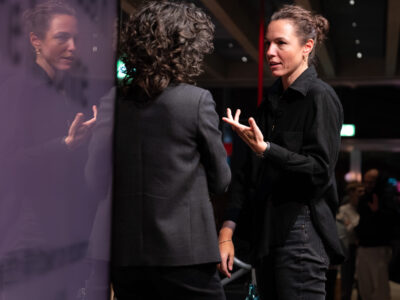Even German Press Freedom is Fragile
The Freedom of Information Act (FOIA) is fundamental for investigative journalism in Germany. Coalition members from the CDU and CSU recently sought to abolish it, but were prevented from doing so by broad public resistance.
Guest contribution by Daniel Drepper, chair of Netzwerk Recherche

“The press needs to have the freedom to say all so that certain people don’t have the freedom to do all.” Attributed to the American columnist, Stewart Alsop, this quote summarizes quite well what I believe to be the core of journalism. But press freedom is not just about the right to report in the broadest and deepest way possible, it is also about having access to as many sources as possible. And it is for this reason that I’m happy to have seen almost half a million people stand up for press freedom in the past weeks, and to have seen so many media sources reporting on our actions regarding the Freedom of Information Act (FOIA).
At the end of March, the online platform Ask the State(Frag den Staat) published initial draft proposals from the coalition negotiations, which were met with significant outcry. A working group headed by the CDU politician, Philipp Amthor, had penned the following sentence: “We intend to abolish the Freedom of Information Act in its current form”. It seemed that the CDU and CSU, who were responsible for the wording, were intent on burying a law that is central for transparency, citizen participation, and critical journalism. Yet the FOIA, introduced in 2006, is of fundamental importance, especially for journalism.
The law determines citizens’ fundamental right to access government documents. It overrides official secrecy. In principle, any citizen can request information from their local municipalities, as well as from state and federal authorities. Why did renovating the gymnasium end up being so expensive? When was the last time the crumbling bridge on the main highway was inspected, and what were the results? How clean is the lake in the neighbouring district, and how hygienic is the cafeteria at my university?
The FOIA also provides journalists with a means of accessing official documents without having to convince anyone to break the rules. Alongside conversations with potential sources, public information online or in databanks, and the right to information from authorities under press law, the FOIA is thus an important fourth tool in the journalist’s toolbox, particularly that of the investigative journalist. It is especially helpful both to those who are new to the profession and do not yet have many contacts, and for presenting certain things clearly in black and white. After all, documents made public by FOIA requests can reveal significant connections that journalists might otherwise never uncover.
Consider the following examples from my own everyday work:
At the end of 2020, as the first year of the pandemic was drawing to a close, the Federal Ministry of Health, under Jens Spahn, secured substantial additional profits for pharmacies. Pharmacists distributed FFP2 masks to the public and were reimbursed for each to the tune of six euros, though they themselves paid only €1.50 per mask. Colleagues of mine at North German Broadcasting (NDR), West German Broadcasting (WDR) and the Süddeutsche Zeitung (SZ) sought to understand how this decision had been reached at the Health Ministry. Thanks to an FOIA request, they were provided with numerous documents and could thus show that the relevant department at the ministry considered it a waste of money, yet Minister Jens Spahn personally insisted the policy go ahead. The damages amounted to several hundred million euros in taxpayer money.
Earlier this year, I worked with colleagues at NDR, WDR, and SZ to publish an investigation into lobbying activities regarding plans to limit the use of PFAS chemicals, which while useful, are potentially extremely dangerous both to the environment and to public health. In the course of the international investigation, our team filed 180 FOIA requests, one of which concerned the Ministry for Economic Affairs and brought documents to light about a meeting between the Ministry and industry representatives. The documents revealed that the Habeck Ministry had adopted misleading arguments from industry lobbyists and thus supported weakening health and environmental protections, despite expert advice that this could prove highly problematic.
The FOIA has existed in Germany for 20 years and is currently in effect in 14 federal states. Compared to international transparency law standards, it is actually rather weak. Moreover, there are so many exceptions that documents are either not issued at all or are heavily redacted. It is also difficult to take legal action should a government body refuse to release information. It was this that motived us here at Netzwerk Recherche, the association for investigative journalism in Germany, together with other organisations such as Transparency International and Mehr Democratie, to draft a proposal for a robust transparency law two and a half years ago. We want government agencies to publish their records proactively and with less exceptions.
Yet during the recent coalition negotiations, the FOIA’s very existence suddenly came under threat. The mere attempt to get rid of the law constituted a trial ballon of sorts, and goes to show just how little certain politicians appreciate the fundamental importance of investigative journalism and transparent administration in sustaining a functioning democracy.
At the same time, this provocation has shown how much support can be mobilised when civil society is attacked. More than 430,000 signatures were gathered in a few short days, accompanied by a great deal of reports in the media and widespread public outrage. It was not a reaction that I would have expected for a law that, while extremely relevant for my work as a journalist for over the last 15 years, had otherwise attracted very little mainstream attention.
This support has been very encouraging and it ensured that the wording in the final draft of the coalition agreement was changed. It now reads “we intend to reform the Freedom of Information Act from its current form to provide an additional value to citizens and public administration”. The change is an important indicator and a victory for civil society. Precisely what the new wording will mean in practice, however, remains to be seen. We will be watching closely.
Photo Credit: © Friedrich Bungert


